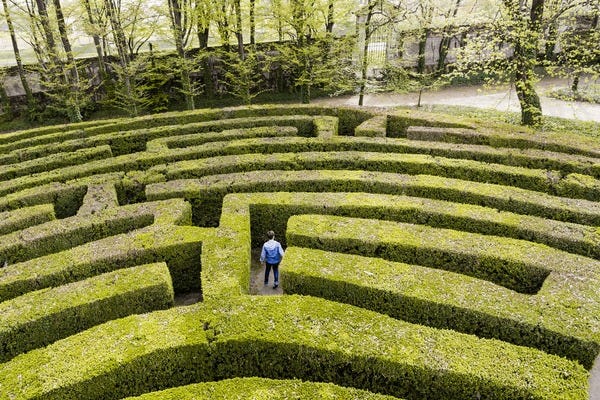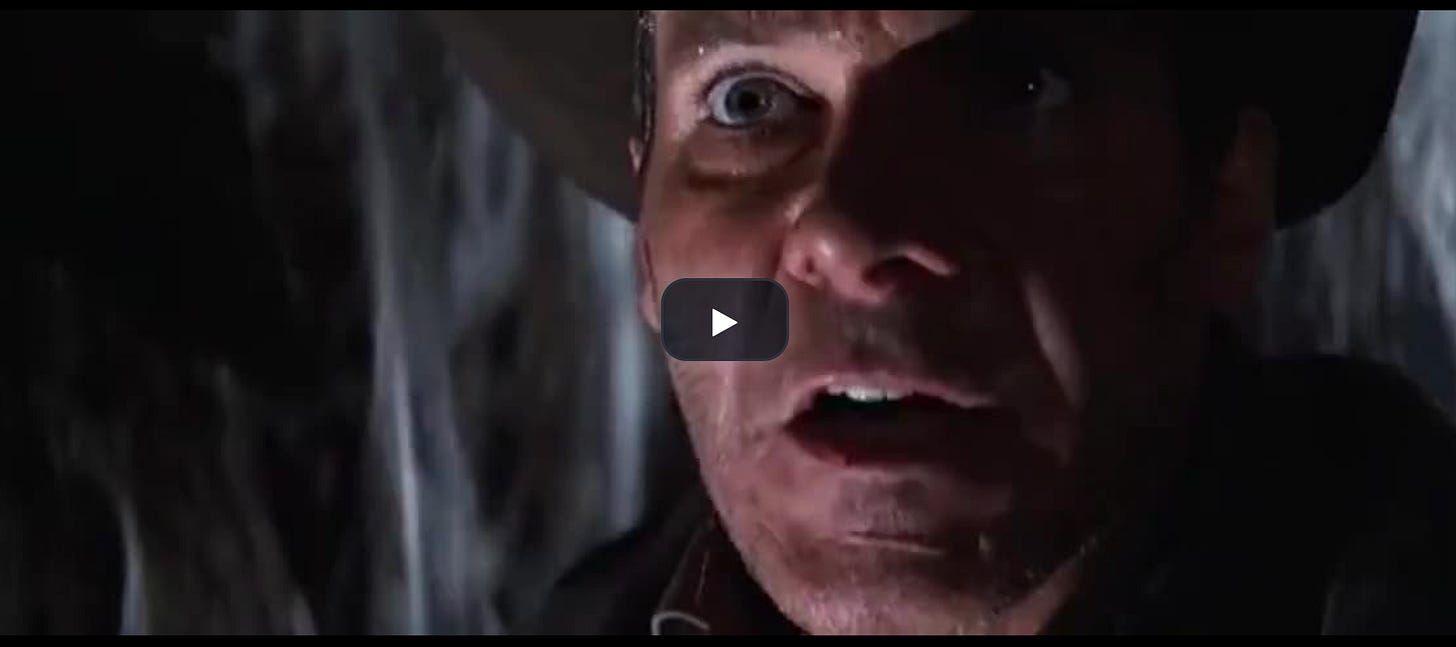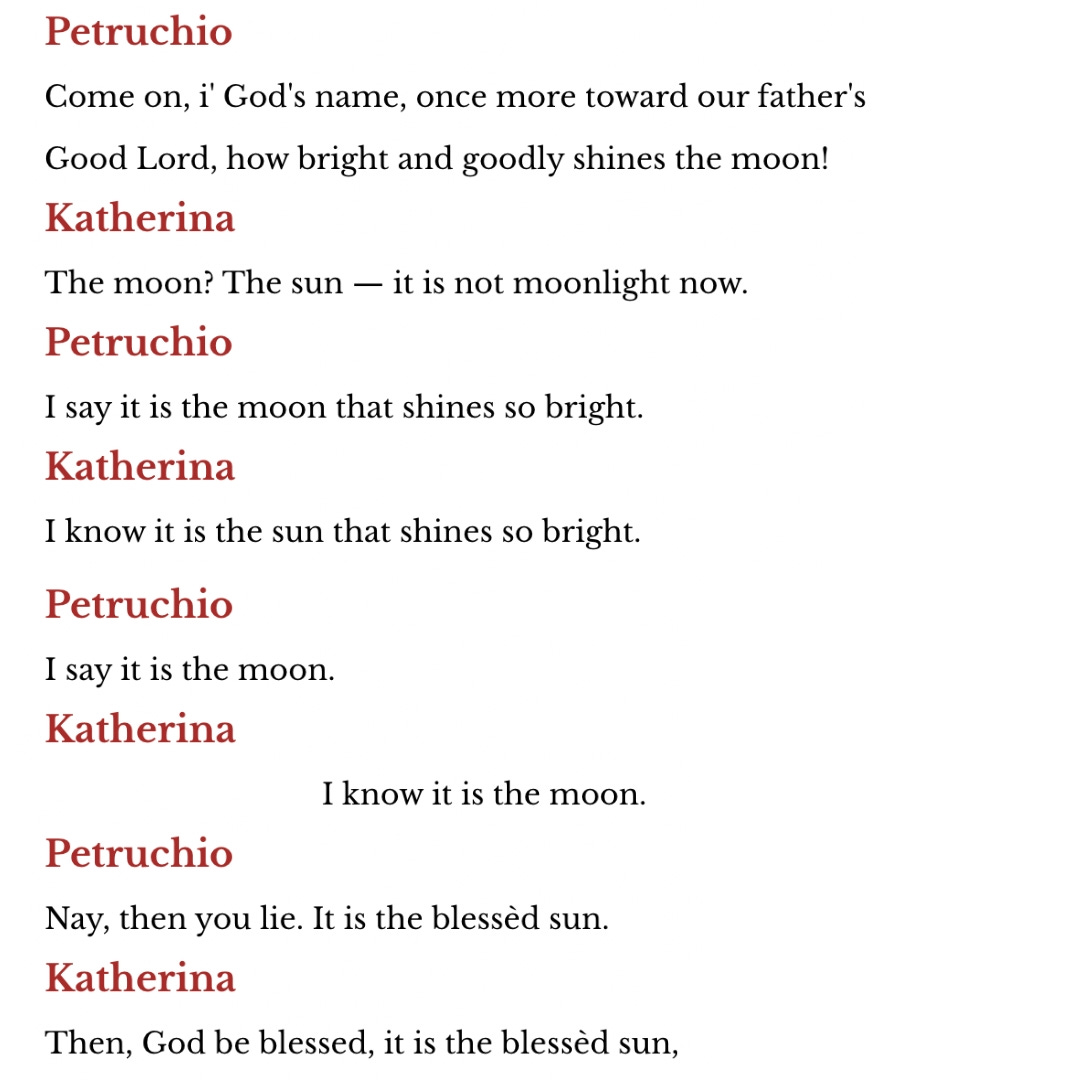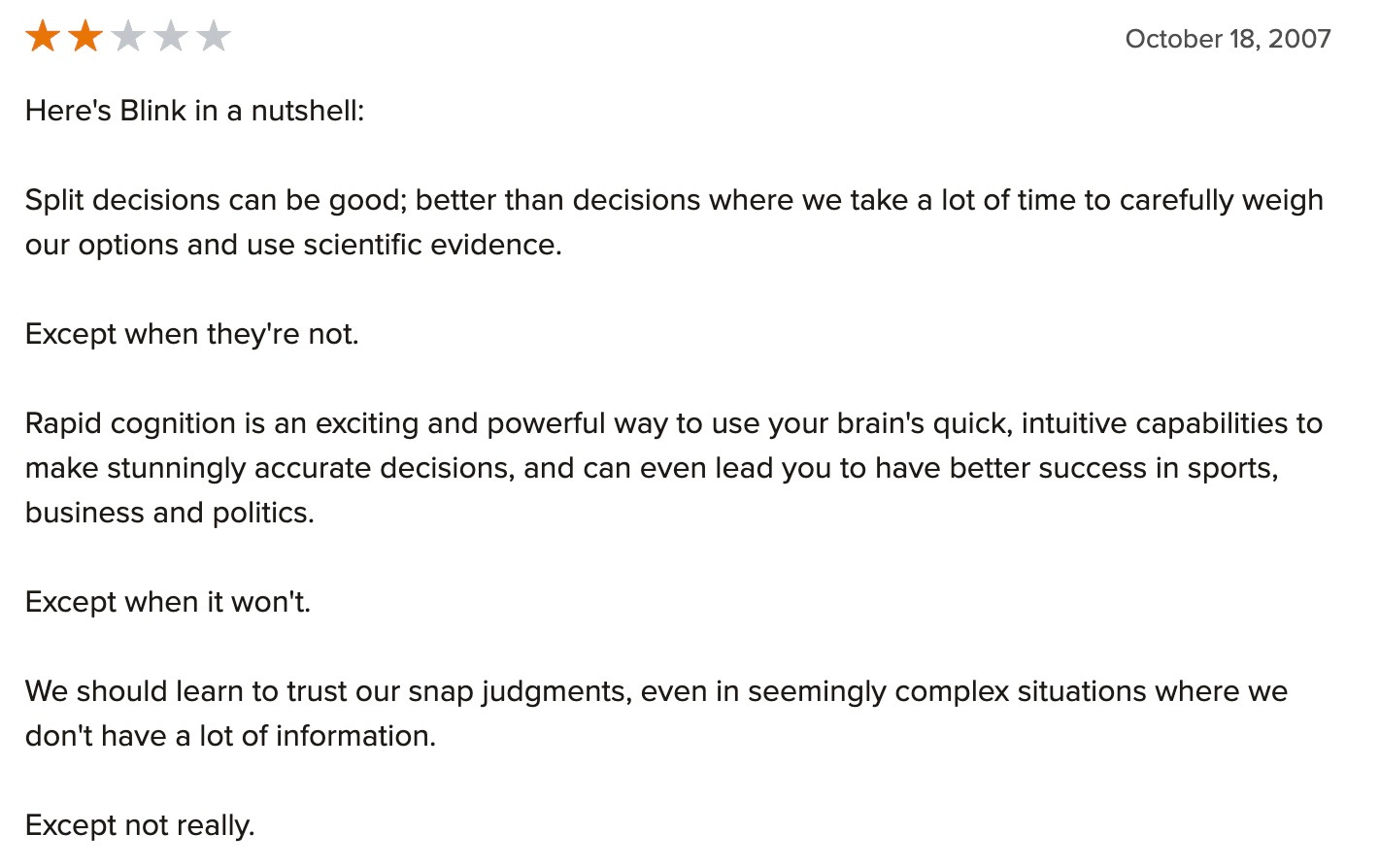
Today’s essay is part of a new series that includes me, Latham Turner, Bowen Dwelle, Michael Mohr of Sincere American Writing, Dee Rambeau, and Lyle McKeany. You may remember our past series on fatherhood, recovery, and work. This week, all of us wrestle with what trust means to us.
Out Of The Therapy Labyrinth
I made a dumb decision once in a baseball game.
The score was tied after I’d doubled in a run, and I took a generous lead off second base, pledging to score if a hit cleared the infield. The next batter blooped a single into shallow left, and I didn’t think twice before churning for home.
Part of me knew that the play would be close, but another part of me wanted to run the catcher over in front of the home crowd. Sure enough, the throw came in a step ahead of me, and I lowered my shoulder. The catcher was a big kid, and I knocked him flat. But when the dust cleared he held up the ball. I was out.
My shoulder and upper back were a mess for years afterward. I kept going to a chiropractor for the satisfying crack, but the ache settled in again almost as soon as I left his office. I came to believe that my back would never be whole on its own. And he did nothing to disabuse me of my dependency.
I later made more progress with stretching, massage, and more balanced workouts. Despite some minor injuries along the way, it’s been nearly thirty years since I darkened a chiropractor’s door. Which is not to say that I imagine myself completely free of professional help, but that my default has swung to trusting my body to know when it’s fine and when something is seriously wrong, rather than waking every day with the niggling feeling that something deep inside me is off.
Self-trust is a little more complicated when it comes to mental health. In the best case, therapy is a crucial tool in self care. But therapy can also tip your inner scale toward self-doubt. My feelings are valid, but they are probably cognitive distortions. I have to be “enough” alone before I am fit to start a relationship. Ergo, I can’t trust my feelings, and if I really need something from my partner, I am the problem. Whatever it is, the sickness is me.
I’m sure therapists follow ethical guidelines, but I wonder how many of them would agree that a person could graduate from talk therapy. Could energizing friendships, exercise, gardening — a whole and healthy life — be enough? Or is our culture so riddled with rot that we’re always going to be unbundling baggage about our bodies, identities, and past traumas? At what point does the language we learn in therapy have its own distorting effect?
I’m beginning to question whether I’m always going to need a professional who can pop my hood, squint underneath, and tell me how my wiring has snarled. Maybe the only way out of that self-fulfilling prophecy is to learn how to trust myself once again. To feel that my instincts and thoughts are mostly sound, or at least not perennially in doubt.
The Rationalist’s Curse
Most of us who enjoyed a traditional liberal arts education learned how to think critically, which is a form of doubting. America is not a Christian nation, not if you look at the founding documents, not if you read Thomas Jefferson’s Notes on the State of Virginia. Liberally educated people learn to make do with partial truths, reasoning their way toward cautious principles and hedging even scientific claims as falsifiable — temporary explanations rather than immutable proofs.
The pilgrim in Plato’s “Allegory of the Cave” desires truth more than anything, but he is perpetually discovering another dimension that upends everything he thought knew.
William Cronon captures the idea in his classic essay “Only Connect”:
A liberal education is not something any of us ever achieve; it is not a state. Rather, it is a way of living in the face of our own ignorance, a way of groping toward wisdom in full recognition of our own folly, a way of educating ourselves without any illusion that our educations will ever be complete.
I embraced that view for many years, and I think it’s the frame therapists use for the self. Mental health isn’t a state. You’re never done. It’s more like homeostasis, the body’s dynamic equilibrium, which is never at rest.
But after so many destabilizing life events, I’ve found myself wanting to double down just as much on belief — in institutions, in verifiable facts, in myself as a reliable witness to my own life.
Malcolm Gladwell’s Blink, published in 2005, captures the indeterminacy that I often feel after speaking to a therapist. A frustrated reviewer on Goodreads summarizes the book well:
Gladwell doesn’t offer a clear method by which all of us can cultivate more accurate snap judgments, and so the takeaways feel slippery. Either you’re born with trustworthy gut impulses, or you’re one of those people whose instincts will always lead you astray.
I kept reading Gladwell the way I’ve dutifully returned to some therapists, experiencing satisfying cracks in my mental spine — momentary clarity and relief. But then the book would start hedging its bets, qualifying its claims, and gnarl my thoughts all over again.
A more earnest strain of this thinking emerges in Nicole LePera’s How to Do the Work. LePera’s operating assumption is more hopeful than Gladwell’s — you have the power to heal yourself — but in some ways it’s more like the doctrine of original sin, just with the Self as Savior. We’ve all been warped by our past and must identify those patterns, break them, and reassemble ourselves to be whole.
There’s a grain of truth in all this, just as there is in living humbly in the face of ignorance, but I’ve come to resist the phrase do the work because it registers as a form of self-doubt, sometimes even as penitence. I can’t help picturing Indiana Jones on his last crusade, murmuring “The penitent man shall pass,” then dropping to his knees before a blade whizzes overhead.

I’ve done my share of this work in therapy, both individually and with couples counselors, and I’ve come to feel that it leads to paradoxes like Gladwell’s — tantalizing, ostensibly useful, but ultimately elusive.
Truth be told, I’m weary of being a perpetually penitent man.
I think what I’m looking for is a way out of the rationalist’s curse. Because the rationalist, like the self-helper, is never done. There’s always more reasoning to do, one more logical stone to roll up the hill, one more book to read on parenting or anti-racism or imposter syndrome. The Romantic in me wants to live just as much by feel, to inhabit my life more than picking it apart, to replace freezing reason with warmth.
Trusting and Doubting “The Guard”
One of my therapists gave my defensive instinct a name in an effort to dissociate the behavior from me. She called that part of myself The Guard. Allegedly, The Guard was always whispering things to me that weren’t true. He would take offense where none was intended, overreact to small slights, watch suspiciously for the next betrayal of trust.
So my task was to identify that voice and argue against it. Get The Guard out of my head. Stop listening to his lies.
It sounded good in theory, and I worked hard at the plan for a time, but the problem was that The Guard kept grounding his claims in evidence: things that friends and even my therapist agreed were alarming. And immediately after my ex and I decided to separate, it was clear that he’d been telling the truth all along.
I emerged from that wreckage wondering what I was to do with hours of advice that I’d come to see as ill-conceived. There was no such thing as The Guard. That was my body telling me that I was unsafe, my eyes seeing things that were true, my ears hearing words that were every bit as ominous as they sounded. It was a relief to see that no one, no matter how addled by grief, could have conjured the whole thing.
I now have two options:
Believe that The Guard is real, a monster of false vigilance that has lured me into self-fulfilling prophecies that I’ll keep repeating to my eternal ruin if I don’t get my act together
Or to trust that my body and soul know where they belong and where they do not, know when I am playing Katherina to Petruchio

Katherina has no way out of her role. Blessedly, I found the way out of mine.
Trust Thyself in Art As Well
I have been astonished to find the patterns that haunted the last days of my marriage running rampant through higher ed and the publishing industry. On each of these fronts, I’ve stopped to wonder, earnestly, whether I was seeing crisis where there was only difficulty. But the major structures of meaning that I built my adult life around really have crumbled or are crumbling.
It's the first time I've had an inkling of what the American modernists felt. Willa Cather’s phrase was that the “world broke in two.” She couldn’t go back to the way it was before.
Hemingway captures the feeling in Frederic Henry’s grief. After escaping the war, making a new life with his love, Catherine Barkley, and awaiting the birth of their first child, Frederic loses them both in a brutal hospital scene. There’s nothing to be done. Frederic wants to stay, pay his respects, but there’s no use.
‘You can’t come in now,’ one of the nurses said.
‘Yes, I can,’ I said.
‘You can’t come in yet.’
‘You get out,’ I said. ‘The other one too.’
But after I had got them out and shut the door and turned off the light it wasn’t any good. It was like saying good-bye to a statue. After a while I went out and left the hospital and walked back to the hotel in the rain.
Survival for Cather and Hemingway required adaptation and rebirth. They had to learn how to write differently, how to fit the words to the world they were aiming at.
If that sounds a little high-strung, consider that many writers are now rejecting the pillars that have governed publishing for all of my life. Masters of the craft are now being told by editors that they haven’t sold enough books to deserve a new deal. I’ve read absolute drek in The Paris Review, found myself baffled by prizewinning books, and remain mystified by the esteem that some writers have earned with what looks like froth to me. And the stigma of self-publishing is steadily eroding.
I still believe that learning how to write to audience is the most important breakthrough a writer can make. But I’m mindful that even the notion of audience is evolving rapidly.
I once wrote for a tiny cadre of gatekeepers with refined sensibilities. I made a thousand craft decisions to please those connoisseurs. But many readers of this series would never pick up a literary journal, would never have read a word of my writing if not for this project. Most of those readers are silent, will never comment or take a survey. I have no concrete idea what will make them laugh or cry or wrinkle their nose in disgust. Most often these days I’m flying blind.
Lit mags have become like Catherine Barkley to me. I loved them once, pored over my manuscripts to curry their favor, felt a rush of joy when they chose me (they chose me!). I thought we had a future together because of our rich history. But for months, sometimes more than a year, I’ve sat by their bedside waiting for a word, finally realizing, like Frederic, that it was no use. All the skill, all the effort in the world doesn’t matter when you’re trying to reach a statue.
The good news is that this project, with its ever expanding community, offers me a way out of that dark tunnel of grief. It goes against every instinct to say it, and I don’t know how to fully believe it, but what readers seem to want, what keeps them tuning back in, is me.
This is a new form of humility. There’s no guide book out there anymore. To serve others well, I have to trust my own curiosity. It’s the idea that teases my mind over days and weeks, the question that feels urgent to me, the ritual with a quirky history that guides my course.
That’s not doing the work. That’s just love. Can trusting that love be enough?
Subscribe to The Recovering Academic
Unlock more essays, interviews, and craft resources










Josh, I'm struck for far from the first time, given our disparate origins and upbringings, by our commonalities. That needn't be so, so it offers no absolutely comforting universal, but it pleases me in its possibility and, of course, more personally, makes me happy for us.
As I was approaching the end of the essay, the thought, in satisfaction, just naturally arose that this is a perfect essay. How it naturally evolved in its not necessary parts from its more general consideration to a more specific focus on loss of your marriage to your creative life. It's all right and true even in its uncertainties.
I first entered psychotherapy at 17 in response to specific problems in my life, a more general one being chronic depression. I left after a couple of years feeling neither dissatisfied with the experience (I'd gained some genuine self-knowledge and been listened to by someone trained to listen in a particular way) nor feeing I was *healed*. I wasn't. I'm still not. But I thought I could go and live on my own. I returned to therapy off and on over my life, always because of particular problems in my life I felt the need to talk through. I did a lot of that also with very close friends I trusted no more than my therapist to reveal *the truth* to me but who I thought could offer me valuable perspectives to consider. They did. My last therapist I saw off and on -- mostly off! -- for thirty years. I spent a couple of years with him last almost a decade ago when I, again, faced a particular problem in my life. Near the end, after his having recognized the direction It seemed very reasonably clear to himI wanted to go, and working then to help me get there, he reacted in vocal astonishment one day when he realized I was going to go the other way! We recently communicated in writing after his retirement, and I told him how things are in my life now. He was pleased and said he thought we'd done good work together over the years. I agreed. He didn't heal me. I wasn't healed. But talking with him, a trained and uniquely insightful person, helped me get through better than if I hadn't.
You end, so well:
"I have to trust my own curiosity. It’s the idea that teases my mind over days and weeks, the question that feels urgent to me, the ritual with a quirky history that guides my course.
"That’s not doing the work. That’s just love. Can trusting that love be enough?"
I'm going to say it's close to enough. It has to be. And that can still include, in the better instances, when the dice fall the right way, someone to love and trust and talk to.
Great musings! From a slightly different perspective, you're identifying how our culture of commodification and addiction--they go hand in hand--leaves you empty, sucked dry. The answer from our institutions is always "the work is never done; you need more, much more, of this; see you next time; swipe or insert here." Trusting yourself is never a legitimate answer, because then you wouldn't be spending the time/energy/money on whoever's selling you this product that you absolutely *have* to have in order to survive another day.
So, a good and healthy response to this is realizing that this is a scam. (Although a line has to be drawn between self-knowledge and knowledge of, say, the physical world. Because a blanket version is this is how we end up with people rejecting hundreds of years of research into, say, global warming or evolution and relying on themselves.) Focus on yourself and what you can intuit and comprehend without the use of middleman mediators. *You* are the expert of your own life, you're living it.
I propose that there's a still better answer.
When you rebel from the middleman scammers, then it's easily framed as You vs. The Scammers. And the energy you once invested in trusting the experts, becomes invested in the You. Very binary.
But what if life isn't all about the You, after all?
Being all wrapped up in the You is only some improvement beyond being all tied up by the 'experts' of your life. What if you could be not-all-wrapped-up in either one?
This isn't an altar call for a particular belief system. My favorite poet John Keats, not a subscriber to any religion, embodied it as well as anyone I've ever known, at least in his writings. Perhaps the Rationalist's Curse's antidote is the Empath's Embrace of the other?
One of my favorite lines in any film is from the French-Canadian socialist/atheist Denys Arcand's "Jésus de Montréal" from 1989. At the end of the thoroughly heretical Passion Play that is at the heart of the film, the character who seems to represent the Apostle John says to the baffled-but-intrigued small audience on the mountain in Montréal:
"Life is really very simple.
It just seems overwhelming
when you think only of yourself.
If you forget yourself
and ask how to help others,
life becomes perfectly simple."